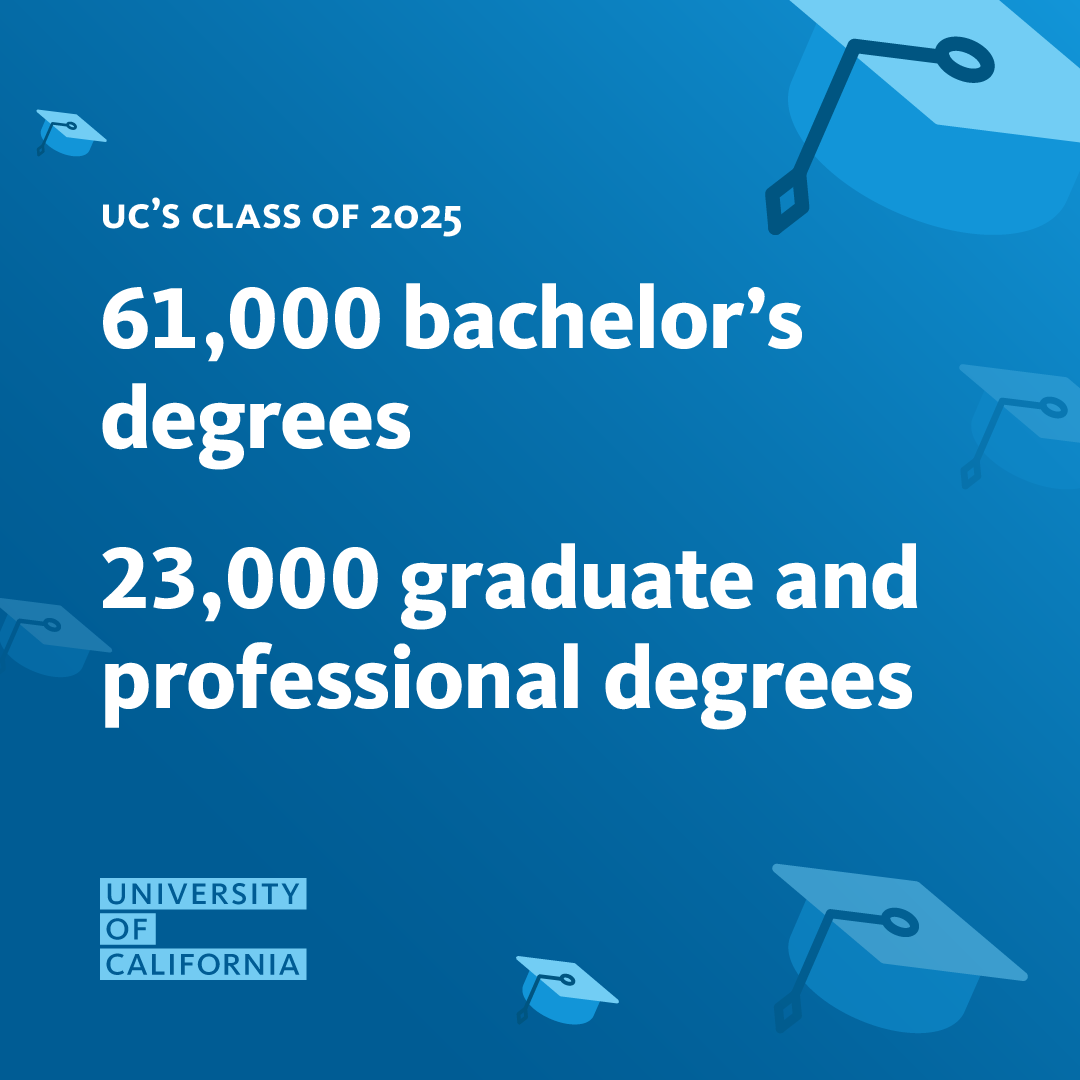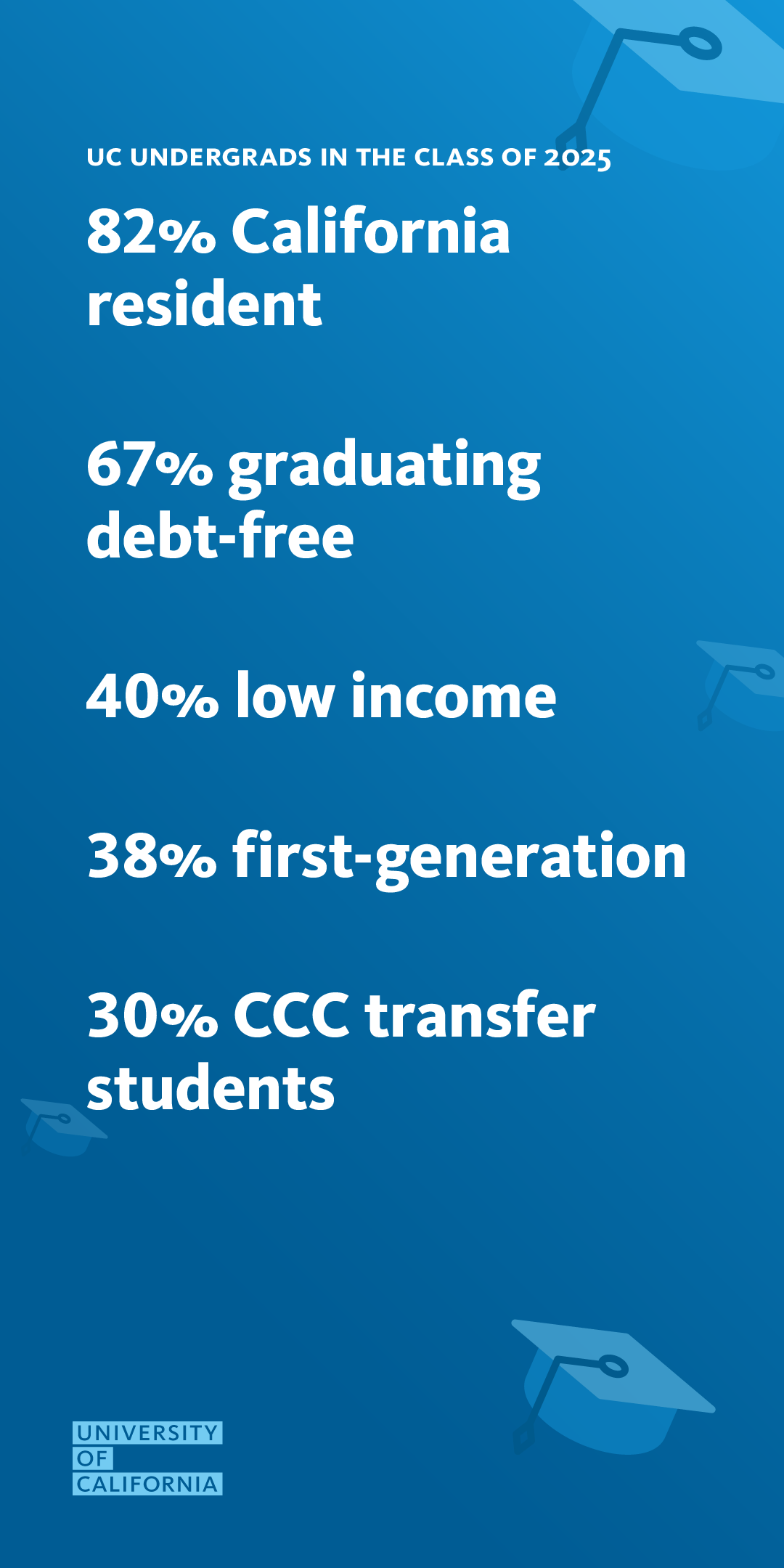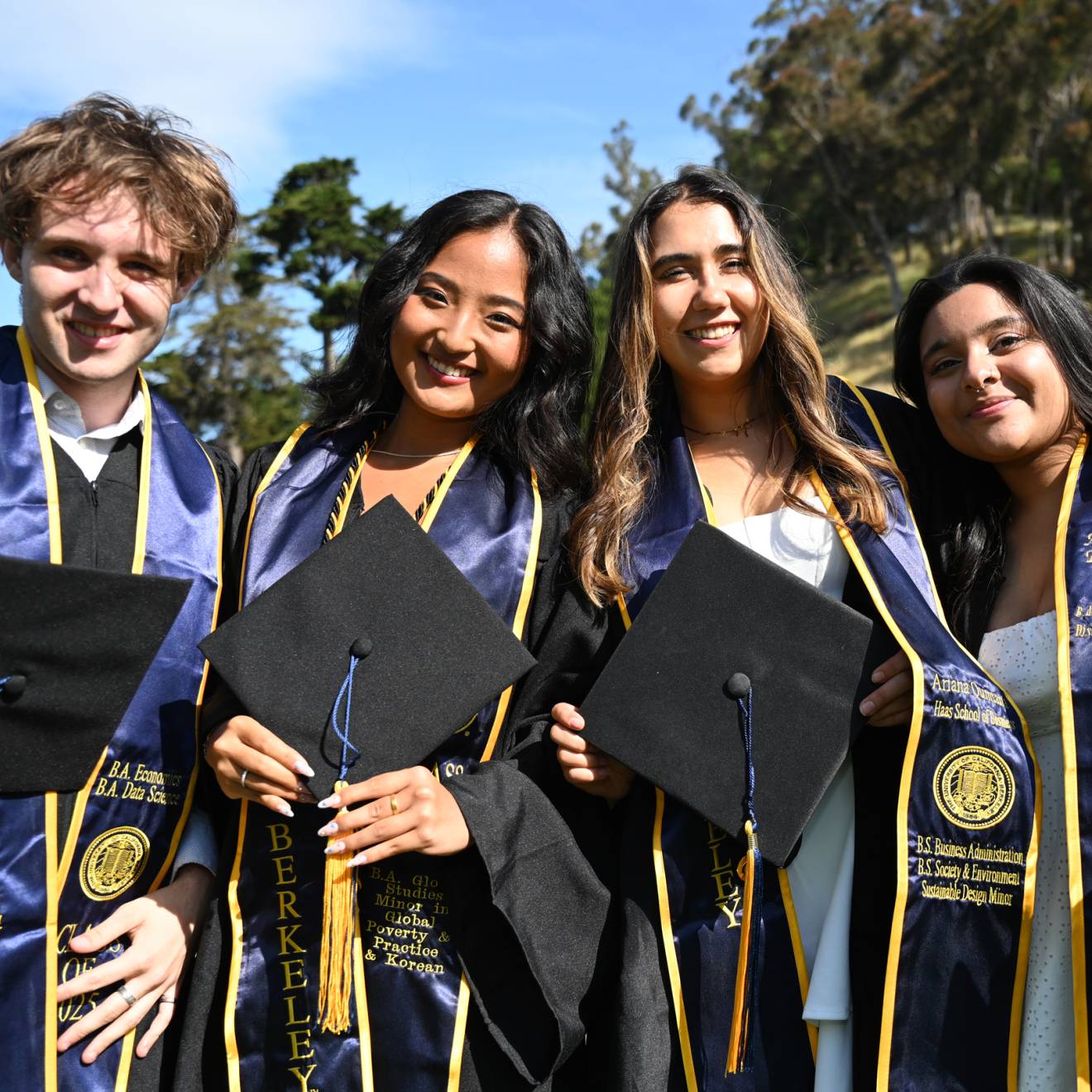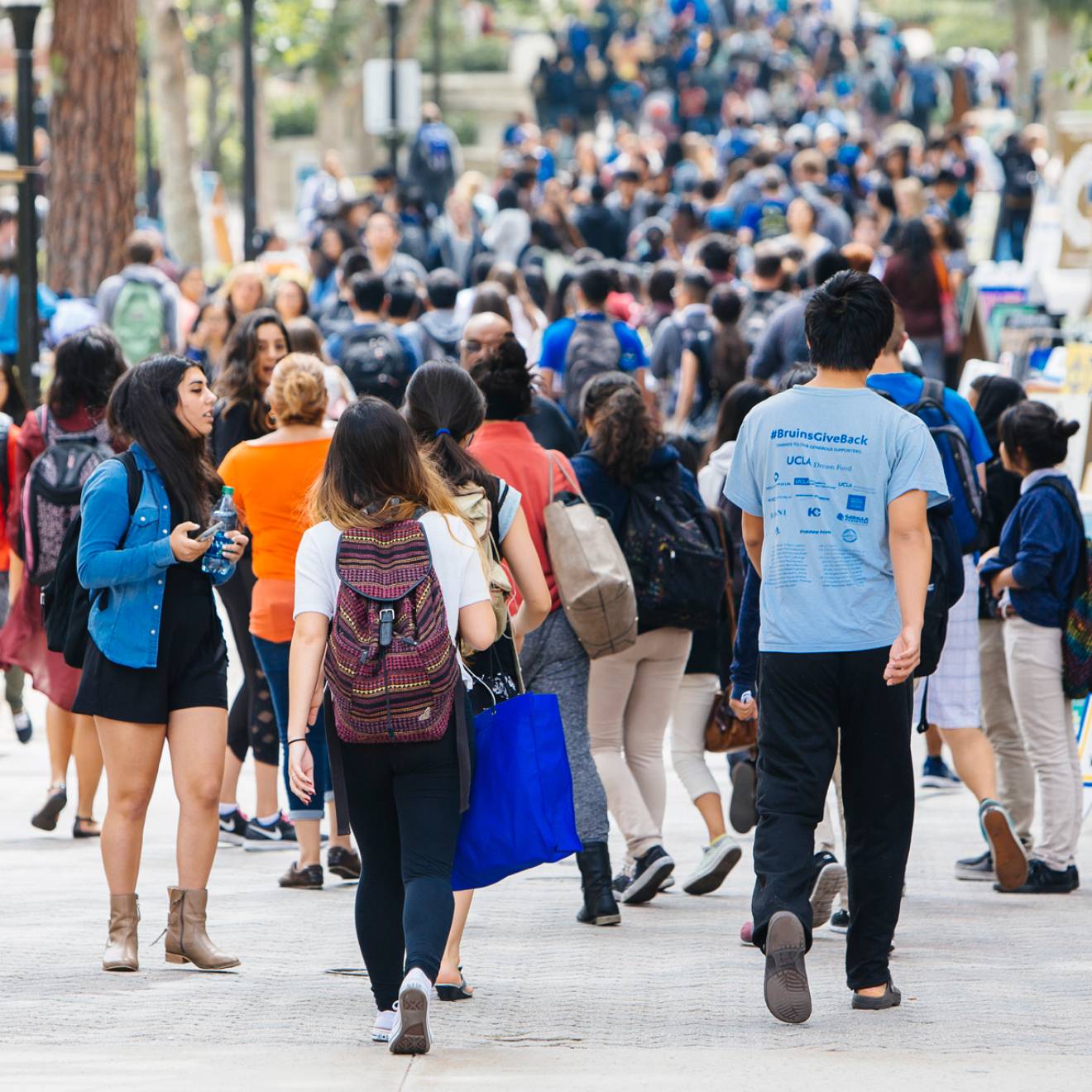When Oluchi Okwu graduates this spring, she’ll be racking up her third higher ed degree — and her second from UC. This time, a master’s in nursing (MSN) will launch her career as a nurse practitioner. Okwu’s path was always pointed toward health, but she didn’t take the standard route to nursing. Most nurses get specialized nursing degrees as undergraduates, but Okwu studied public health. Her pre-med track exposed her to medicine, however, and a job as a medical scribe helping physicians document visits at a community health clinic gave her experience working with patients in a medical setting.
After graduation, Okwu worked as an analyst for the California Department of Health Care Services while completing her MPH. It was a good job, but she missed interacting with patients. Wanting to help people in a more hands-on way, she began researching “direct entry” MSN programs that offer a pathway to advanced nursing for students with non-nursing bachelor’s degrees. The Master’s Entry Program in Nursing at UC San Francisco fit the bill perfectly. Okwu sat for her RN exam after a nonstop first year. License in hand, she then worked part-time as a nurse while completing the next two years of the program to earn a master’s and become a nurse practitioner.
“Coming into this program — for a lot of us, this is our second, third, fourth career. We come from so many different backgrounds, but we all bring our unique experiences and knowledge to the nursing field. I’ve been fortunate to have been blessed with instructors who have given me the tools, knowledge, skills and resources to start practice.”
What’s next? This summer Okwu will begin working as a nurse practitioner through a UCSF Cancer Services Advanced Practice Provider Fellowship. It’s an added layer of specialized training and, with just three fellows each year, is extremely selective. In the yearlong program, she will rotate through cancer specialties, such as hematology, medical, surgical and radiation oncology. At the end, she’ll be eligible to be an oncology nurse practitioner at UC San Francisco, where fellows are often hired into permanent roles.
Growing up in Cambodia under the Khmer Rouge, Nicole Sang Lav’s parents had scant access to schooling. The regime targeted and killed educated people, like Lav’s great-uncle, a teacher, and other friends and family members. Raising their daughter in the U.S., her mom and dad were determined to help Lav not only go to college, but to earn an advanced degree.
At home, Lav served as the translator for a family that spoke little English. When family members got sick with Alzheimer’s disease and brain cancer, it often fell to her to talk with doctors and navigate clinics and hospitals. What emerged was a fascination with the human brain and a determination to one day become a neuroscientist herself, doing research that could help people like them.
These intertwining passions for education and medicine led Lav to UC Irvine. As a first-year bio student, cold emails and persistence led to what would become a four-year research assistant post in Dr. Lisa Flanagan’s neurology lab. Halfway through, she won a UC LEADS scholarship, a program that supports undergrad STEM researchers with funding, mentorship, professional development and more. The seed for her second major in philosophy germinated in a course she took on a whim, Animal Ethics and Religion. Philosophy was totally new to Lav; the humanities perspective helped her think in different ways, bringing new excitement and perspective to her work in neuroscience.
What’s next: This summer Lav will hop south to UC San Diego to start work on a Ph.D. in neuroscience. She’ll be in the first cohort of UC LEADS Fellows — a five-year doctoral scholarship for students who participated in UC LEADS as undergrads.
Justin Monk grew up unaware he had spent time in foster care as an infant. He’d lost his father at a young age and had to navigate the challenges of limited resources throughout his childhood in a single-parent home — “rough times,” as Monk remembers it. But the Central Valley native prioritized school and never lost sight of his desire to help those who didn’t have a voice.
Monk has wanted to be an attorney since grade school and decided at age 16 to become a public defender and child advocate. It wasn’t just what he refers to as his “combative” nature that propelled him toward the law, but also an innate calling.
Only during his second year at UCLA, while planning for law school, did he learn more about the circumstances of his early life. The discovery shifted how he saw his own story; not as a setback, but as a reason to stay focused on helping others with shared experiences. It also led him to find community and resources through the Bruin Guardian Scholars program, or BGS, an organization that provides support for current and former foster youth at UCLA.
The program provides a range of services, including emergency scholarships, priority enrollment, housing support and career development funding. (There are similar programs on all UC campuses.) But the Guardian Scholars’ greatest strength, according to those who rely on it, is the community it cultivates.
As a paid intern with the program, Monk now helps others navigate college life and academics. He answers questions about class registration and financial aid, among other topics, and organizes events that bring BGS students together, from formal holiday gatherings to impromptu picnics. As he puts it, “The BGS community gives you what a lot of us missed growing up — a sense of belonging and people who just get it.”
What’s next? After receiving his UCLA diploma, Monk will take a gap year to give his undivided attention to his J.D. program application materials and choosing the right school. The BGS program paid for his LSAT prep and testing.
Profile by Madeline Adamo, UCLA
The daughter of immigrant field workers, Yesenia Pérez grew up in a small town in the Central Valley amid a tight-knit Latino community. Her parents had only an elementary-level education and limited job prospects outside of agriculture. Starting at age 16 and continuing through her college summers, Pérez picked the grape harvest alongside them. Though work was a necessity, schooling was of paramount importance. “My parents always supported me in my educational journey, even though they might not have fully understood all the generational cycles and barriers I was breaking,” says Pérez.
When Pérez applied for college, money was tight, the price tag was intimidating, and she worried about how she would pay for it. “When I applied for the FAFSA, I didn’t know what the Student Aid Index was, and I didn’t realize there would be more aid coming from the state and from UC,” she remembers. But her admissions package included a Promise Scholarship for high-achieving, low-income students that covered tuition, fees, room and board for all four years. The program also provided the resources she needed to be successful in her new life: a staff advisor and a peer mentor, along with workshops on how to navigate campus, hone study skills, write a resume and prepare for graduate school. Early on, as Pérez was struggling through the start of an econ major, it was Promise Scholars director Holly Roose who advised her to follow her strengths and passions, leading her to pursue a degree in history and business communication.
What’s next: This fall, Pérez starts a master’s program in Technology Management at UC Santa Barbara, with tuition and living expenses fully covered through a graduate Promise Fellowship. The cohort-based program will have her working with a local company to learn applied business problem-solving skills, priming her to enter the job market with valuable experience and zero debt at graduation.
As a kid, when his mom would ask him what he wanted to be when he grew up, Rui Yu would always choose police officer or firefighter. He didn’t know there were heroic jobs in science and engineering, too. That was until he found MESA. Short for Mathematics, Engineering, Science, Achievement, MESA’s middle and high school programs around the state expose kids to STEM who might otherwise not have those opportunities. The goal is not only to spark curiosity, but to lay the groundwork for students to excel in STEM fields in college and the workforce. For Yu, the MESA afterschool program at his Stockton middle school was one of few options at the end of classes. The program was free and allowed his mom a few extra hours at work, so, as a sixth-grader, he signed up.
“MESA showed me, hey, you can apply your physics and your math that you’re learning in the classroom to real life projects,” says Yu. The students worked together to build Popsicle-stick bridges and raided the recycling bin to make Rube Goldberg machines (dubbed “MESA machines”). “I had so much fun with my friends, experimenting and getting my hands dirty. All the materials we needed were provided. That was really wonderful because if my parents had needed to pay for supplies, I might have not been able to continue with the program.” Yu did keep going with MESA into high school, until Covid-19 shuttered on-site programs in his junior year. By then, he was locked in on a STEM path and ready to make the leap to UC.
Immigrants who worked in food service, Yu’s parents had always envisioned him becoming a doctor. While he dutifully tried to pursue that path, deep down, he knew his passions lay in engineering. He wanted to bridge the two fields but wasn’t sure how. The answer came in a summer internship with a medical device company. “From there I was able to see how I could pivot and also get the knowledge and skills I needed to move into the field right out of college.” Switching from a biology to an engineering major, all the pieces fell into place. Yu discovered the MESA program at UC Davis and was hired as a student assistant, a paid job that has him helping local middle- and high-school MESA participants to have as much fun as he did by applying math, science and hot glue to real-world challenges.
What’s next? After graduation, Yu will be joining Alameda–based biomedical device company Penumbra as a manufacturing engineer. The company fabricates clot-busting catheters and other medical devices to treat pulmonary embolism and deep vein thrombosis.
One of Emily Thompson’s formative experiences as a teenager was also a traumatic one. As a senior in high school, she was sent against her will to an extreme wilderness therapy program, meant to reform her from lightweight transgressions she describes as “you know, teenager things.” It was a punishing experience in many ways, but it also became a deep source of ideas about the intertwining of nature, culture and adolescence that she has been able to explore in her academic and creative work at UC.
Afterward, Thompson moved to Long Beach, where she met her wife and welcomed their first son. Confronting the harsh realities of the job market without college diplomas, the couple decided to enroll together at Long Beach City College. “I just sort of found my place, and I found that I loved learning,” says Thompson. Their son even enrolled in the preschool on campus. “It was just this amazing situation that helped us get on our feet,” she says. They finished together, applied to 4-year schools and even got into the same 13 universities. With its Student Parent Center, parent grants and family student housing, UC Berkeley was a no-brainer.
As a parent and student, Thompson has taken her time at Cal, adjusting her course load to accommodate family and even having a second baby along the way. Five years after she first enrolled, she is leaving having made the most of it. Her wife, Yasmin Khajavipour Thompson, graduated in 2023 in Comparative Literature and is finishing the second year of a law degree at UC Law San Francisco, with plans to become a juvenile public defender.
What’s next? Thompson is currently working for the Los Angeles Review of Books, coordinating its renowned summer publishing workshop. In the fall, she starts a Ph.D. in Film and Digital Media at UC Santa Cruz. The program is fully funded for 5 years, after which time she aims to become a professor herself. She chose the program because it combines both film theory and practice, and because her wife and children are members of the Amah Mutsun Tribal Band, native to the area.
In her first quarter at UC Riverside, two things helped take Debanhi Rojas Figueroa from wary high school student to full-fledged Highlander: a great roommate and Poli Sci 51A. The first she acquired through excellent luck with Instagram roommate matching; the two became fast friends, creating their own mini-support system and rooming together for three years. The second, Introduction to Politics Around the World, was her first foray into her major. Figueroa had felt a little unsure about her selection of political science, but the fascinating class reassured her that she had chosen the right path.
Later, Figueroa got to explore the inner workings of local government in a popular course taught by former Riverside mayor and famed professor Ron Loveridge. The class led to a two-quarter internship with state Senator Rosilicie Ochoa Bogh in nearby Redlands. Ultimately, Figueroa found her sweet spot in research. A two-quarter class on social science and humanities research with Dr. Kim Yi Dionne gave her a crash course in research methods and data collection along with practice applying those skills as a research assistant in the Dionne Publicly Engaged Research Lab (DPERL). At DPERL, one quarter turned to seven as Figueroa honed her research skills and became an integral member of the lab.
A summer political research program at the University of Pittsburgh further cemented Figueroa’s interest in a career in academic research and teaching. She may have started college with hesitation about where she was headed, but she is finishing with certainty.
What’s next? Figueroa has full funding as a Ph.D. student in Political Science with a concentration in Comparative Politics at UC Santa Barbara. She received the Regents Fellowship, the highest fellowship the department offers.
Klaus Stephenson is aiming for the stars — literally. An astrophysics major at UC Santa Cruz, she racked up some serious hours as an undergraduate researcher, working with the James Webb Space Telescope and UC’s Lick Observatory. She even traveled to Tokyo to present her work on finding exoplanets outside the solar system. These opportunities set her on an ambitious career path — she plans to get a Ph.D. and continue making discoveries as an astrophysics researcher.
Stephenson wasn’t one of those kids fixated on space from a young age. In fact, she came into UC Santa Cruz as a computer science major. She had grown up coding and making her own websites. But she saw college as an opportunity to explore new things, and one of those new things was attending a talk by an astrophysics grad student. She found it fascinating and followed up by dropping in on a Society of Physics Students meeting. It wasn’t long until she was hooked. Stephenson’s curiosity and her coding skills ended up leading her to a research assistantship with professor Andrew Skemer. The work has provided both financial aid for school and class credit, and it even landed her a summer internship at Lawrence Livermore National Laboratory.
“Research really helped me figure out that I want to get a Ph.D. in this field,” she says. “I’ve been able to see what life is really like for academics in a way you don’t get in the classroom. Now I know that I do want the kinds of jobs that require advanced degrees.”
What’s next? After graduation, Stephenson will start a postbaccalaureate position as an instrument scientist at UC Santa Cruz for the Planet As Exoplanet Analog Spectrograph, a new instrument that is being added onto a telescope at UC’s Lick Observatory. She plans to publish two more first-author scientific papers and present at a conference next year, in addition to applying for Ph.D. programs.



